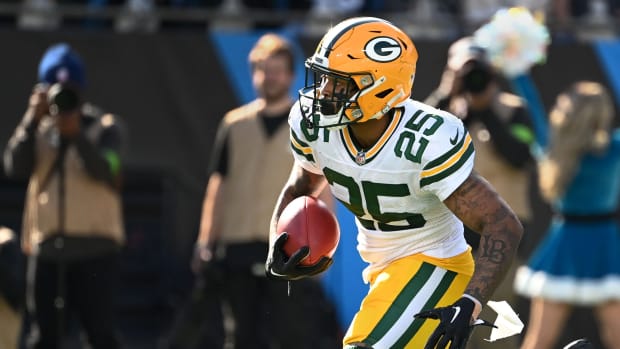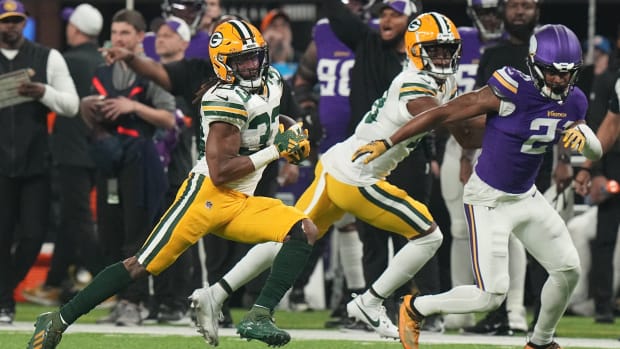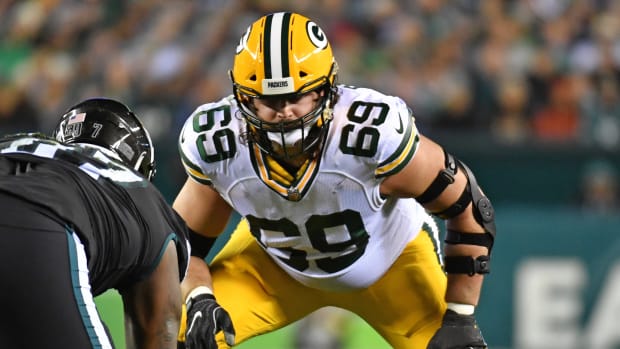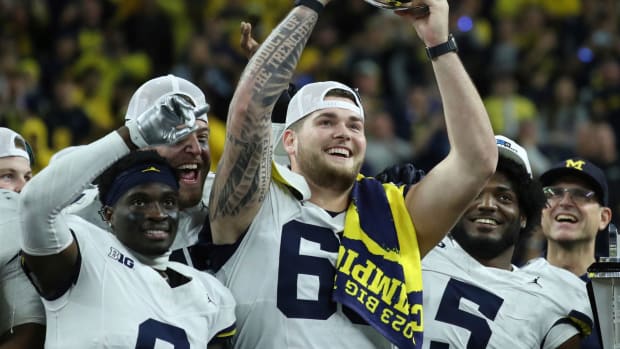Packers Must Weigh Rodgers’ Big-Game Failures
GREEN BAY, Wis. – With the season on the line, the MVP quarterback lined up against a defense that ranked 30th in the NFL in points allowed and 32nd in total defense and threw an interception.
Meanwhile, three weeks later and about 625 miles away and with the season the line, the MVP quarterback lined up against the defense that finished fifth in the NFL in points allowed. With three of his veteran receivers out with injuries, the gimpy quarterback scrambled for a key first down that set up the game-winning field goal to send his team to the Super Bowl.
Elite quarterbacks are paid tens of millions of dollars to be that rising tide capable of lifting all boats, whether they’re a rusty canoe or luxury yacht. One of the quarterbacks threw for 205 yards, including just 12 yards in the fourth quarter. The other threw for 326 yards and two touchdowns.
There’s no mystery the identity of these quarterbacks. One is the Kansas City Chiefs’ Patrick Mahomes, the presumptive NFL MVP who is getting ready to start his third Super Bowl in four seasons. The other is the Green Bay Packers’ Aaron Rodgers, who has won four MVPs since last reaching a Super Bowl in 2010.
The NFL is the ultimate team sport, as coach Matt LaFleur likes to point out. When playing the blame game, simple explanations often are elusive. Take the 2014 NFC Championship Game at Seattle, for instance.
Did the Packers lose because the special teams gave up a touchdown on a fake field goal and an onside kick? Did the Packers lose because the defense gave up 155 yards and two touchdowns in the fourth quarter? Did the Packers lose because the offense turned five takeaways into six points? We could go on but you get the point.
Whenever Rodgers leaves Green Bay – whether it’s in a trade in three weeks or in retirement in three years – it will be easy to point to his play as a major reason why what looked like a dynasty ready to take flight when the Packers beat the Steelers in the Super Bowl crashed and burned on too many runways over the past decade.
While Rodgers and the Packers were eliminated on last-play losses against the 49ers in 2013, Seahawks in 2014 and Cardinals in 2015, and the Packers simply ran out of players against the Falcons in 2016, Green Bay’s recent playoff exits fall in large part on Rodgers’ shoulders.
After missing the playoffs in 2017 and 2018, LaFleur was hired and led the Packers to the NFC Championship Game in 2019. Here are Rodgers’ fourth-quarter numbers from the 2019, 2020 and 2021 playoffs and the 2022 finale against Detroit, which might as well have been a playoff game.
Rodgers in Fourth Quarter of 2019 Playoffs
28-23 win vs. Seattle: 3-for-8, 52 yards, 0 TDs, 0 INTs, 60.4 rating (0 points scored).
37-20 loss vs. 49ers: 7-for-10, 150 yards, 1 TD, 1 INT, 106.2 rating (13 points scored)*.
*All coming after the Packers fell behind 34-7.
Rodgers in Fourth Quarter of 2020 Playoffs
32-18 win vs. Rams: 6-for-8, 90 yards, 1 TD, 0 INTs, 151.0 rating (7 points scored).
31-26 loss vs. Buccaneers: 4-for-11, 54 yards, 0 TDs, 0 INTs, 52.8 rating (3 points scored).
Rodgers in Fourth Quarter of 2021 Playoffs
13-10 loss vs. 49ers: 4-for-7 passing for 17 yards, 0 TDs, 0 INTs, 62.2 rating (3 points scored).
Rodgers in Fourth Quarter of 2022 Finale
20-16 loss vs. Lions: 2-of-6 passing for 12 yards, 0 TDs, 1 INT, 2.8 rating (0 points scored).
- - -
That’s six games. Rodgers only put up big numbers in one of those games – garbage time of the 2019 NFC Championship Game at San Francisco. In the other five games, Rodgers threw only one touchdown – the clutch long ball to Allen Lazard to close out the Rams in 2020.
In elimination games against the Buccaneers in 2020, 49ers in 2021 and Lions in 2022 – all on the home turf, where the Packers were once-upon-a-time invincible – Rodgers went 10-of-24 passing for 83 yards with zero touchdowns vs. one interception. Long the owner of the best passer rating in NFL history, Rodgers’ rating in those three games was a woeful 33.9. He led the team to two field goals in eight possessions.
There’s a reason why Tom Brady, who announced his retirement on Wednesday, will go down as the greatest quarterback in NFL history even while Rodgers’ numbers in some cases are superior.
Brady won seven Super Bowls. In those championship games, he delivered six game-winning drives and three fourth-quarter comebacks. Rodgers in his entire playoff career provided two game-winning drives and one fourth-quarter comeback – the still-controversial “Dez Caught It” game against Dallas in 2014. The Rodgers that made magic at the end of the 2016 playoff win at Dallas too often forgot the cape and magic wand.
“As a team we’ve struggled to figure out a way to play really well in these final games that have everything on the line, kind of win-or-go-home games,” general manager Brian Gutekunst said at the end of the season. “So, we’re continuing to look at that. It’s very important to us. Whenever you don’t finish the Super Bowl off with a win, you’re going to look back and look at why you didn’t play better in those games.”
If Rodgers decides he wants to play in 2023, a seismic decision must be made. Keep going with Rodgers and hoping that everyone from the quarterback to the head coach to the last man on the roster can deliver their best when their best is required. Or handing the baton to Jordan Love and hoping a different quarterback can deliver different big-game results.
More Packers Offseason News
What does Tom Brady’s retirement mean for Aaron Rodgers’ future?
100 days of mocks: PFF picks a pass rusher
Aaron Rodgers on timeline, trade rumors
Fresh odds for Aaron Rodgers’ 2023 team revealed
How does official salary cap number impact Packers?
Rookie class builds solid foundation





